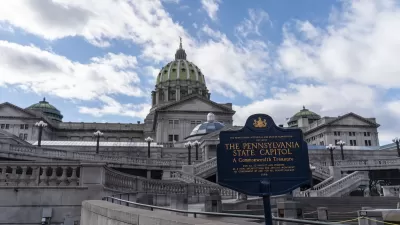Claire Martin examines research conducted by engineering firm Arup and the Clinton Climate Initiative into the actions that cities are taking to reduce their emissions and identifies five cities, including one surprise, that are leading the charge.
Martin reviews the progressive programs and policies that the usual suspects, including London, Copenhagen, New York, and Sao Paulo are doing to curb their energy use and harmful emissions. One surprising city also made her list: Addis Ababa.
"In Ethiopia’s capital, shoddy water pipes are being replaced to help boost the city’s 50 percent leakage rate 'Cities can lose huge amounts of their often energy-intensively produced potable water due to leakage from pipes during distribution,' the C40 study authors wrote. 'Wasting potable water… increases greenhouse gas emissions, and is also a major issue for those cities that are threatened with droughts. The number of drought-threatened cities is rising due to climate change.'”
"That project joins large-scale, low-carbon housing developments that will create new homes for people currently living in Addis Ababa’s shanty towns, the C40 study showed. The city is also planning to convert 40 percent of its land to green space, which serves to absorb CO2 emissions and reduce the urban-heat-island effect. To that end, Addis Ababa’s mayor instituted a plan to plant three million new trees (the most ambitious tree-planting project in the world) and create a giant nature reserve featuring every tree and plant native to Ethiopia."
FULL STORY: Which Major Cities Are Leaders in Reducing Greenhouse Gas Emissions?

Americans May Be Stuck — But Why?
Americans are moving a lot less than they once did, and that is a problem. While Yoni Applebaum, in his highly-publicized article Stuck, gets the reasons badly wrong, it's still important to ask: why are we moving so much less than before?

Using Old Oil and Gas Wells for Green Energy Storage
Penn State researchers have found that repurposing abandoned oil and gas wells for geothermal-assisted compressed-air energy storage can boost efficiency, reduce environmental risks, and support clean energy and job transitions.

Placekeeping: Setting a New Precedent for City Planners
How a preservation-based approach to redevelopment and urban design can prevent displacement and honor legacy communities.

San Francisco’s Muni Ridership Grew in 2024
The system saw its highest ridership since before the Covid-19 pandemic, but faces a severe budget shortage in the coming year.

Colorado Lawmakers Move to Protect BRT Funding
In the face of potential federal funding cuts, CDOT leaders reasserted their commitment to planned bus rapid transit projects.

Safe Streets Funding in Jeopardy
The Trump administration is specifically targeting bike infrastructure and other road safety projects in its funding cuts.
Urban Design for Planners 1: Software Tools
This six-course series explores essential urban design concepts using open source software and equips planners with the tools they need to participate fully in the urban design process.
Planning for Universal Design
Learn the tools for implementing Universal Design in planning regulations.
Heyer Gruel & Associates PA
City of Moreno Valley
Institute for Housing and Urban Development Studies (IHS)
City of Grandview
Harvard GSD Executive Education
Salt Lake City
NYU Wagner Graduate School of Public Service
City of Cambridge, Maryland





























